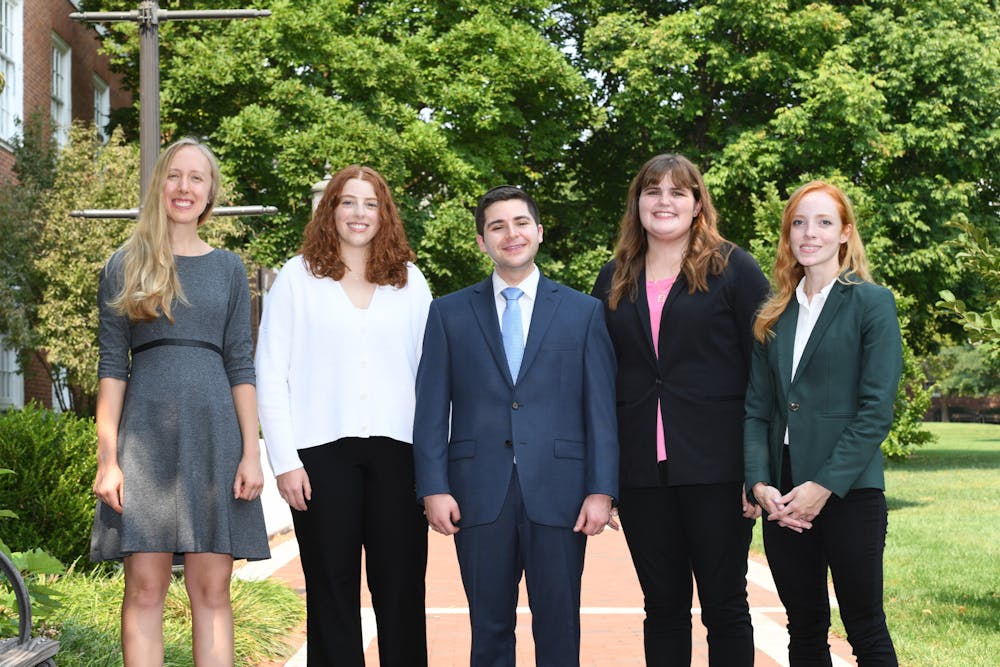Five Hopkins doctoral students — four Biomedical Engineering students and one Electrical and Computer Engineering student — were named Siebel Scholars in 2022.
The Siebel Scholars program was established by the Thomas and Stacey Siebel Foundation to award the most accomplished students among 29 graduate schools. Every year, the foundation convenes scholars for a conference to address one of a host of topics ranging from energy and climate to cybersecurity or class warfare.
Three of the awardees — Elana Ben-Akiva, Alycen Wiacek and Julie Shade — participated in a Zoom interview with The News-Letter.
Ben-Akiva spent her undergraduate career at the Massachusetts Institute of Technology (MIT) and is now a doctoral Biomedical Engineering student. Elana’s first research project — in the Singapore-MIT Alliance for Research and Technology — was to investigate the differentiation of stem cells in different environmental stimuli. This opportunity sparked her interest in working in research and academia in the future.
Ben-Akiva is currently a researcher in the Green Group, a biomaterial and drug delivery laboratory in the Biomedical Engineering Department in the School of Medicine. Her main interest is developing biomimetic particles (particles that mimic human body cells) as a tool for cancer immunotherapy. These particles could effectively deliver instructions to immune cells that could induce them to kill cancerous cells in the body.
Besides her interest in biomaterials and immunology, Ben-Akiva is an active mentor and instructor. She mentors undergraduate students in the Green Group and is a co-creator and co-instructor of a master’s-level immunoengineering course in the Biomedical Engineering Department. This course has been taught four times to graduate students and has been adapted as an undergraduate course.
“Immunoengineering is a relatively new field; there are starting to be more courses, but at the time there weren’t many courses,” Ben-Akiva said. “[Creating course material] and teaching are definitely challenging but very rewarding.”
Ben-Akiva is planning on completing her PhD degree this year and working in postdoctoral fellowship programs in the near future. She wants to gain further experiences in immunoengineering fields, specifically in cancer immunotherapy and infectious disease.
Wiacek completed her bachelor of science degree in Electrical and Computer Engineering (ECE) at Wayne State University and a master’s of science in ECE at Oakland University. She is currently a PhD student in the Department of Electrical and Computer Engineering at Hopkins and a researcher in the Photoacoustic and Ultrasonic Systems Engineering (PULSE) Lab.
Wiacek is particularly interested in applying ECE to addressing clinical problems, mainly using ultrasound and photoacoustic image techniques. In terms of ultrasound, she uses advanced signaling processes and machine learning techniques to improve the sound waves traveling through the tissues. Denoising sound waves and producing clear images of tissues allow radiologists to make more accurate diagnoses. Furthermore, she uses photoacoustic images to differentiate ureter and uterine arteries, allowing gynecologists to perform hysterectomies more efficiently.
“As engineers, sometimes we get distanced from the clinics, but that’s [actually] our true purpose, which is to improve the medicine,” Wiacek said. “So the fact that I can [participate in clinics] gives me a big picture and gives me motivation.”
Wiacek is also the president of the Graduate Association of Women in Computer Science and ECE (GRACE). It was founded in 2015 to foster a network and provide a community for women in ECE and CS. It also assists undergraduates in the graduate school application process.
“GRACE was formed because ECE tends to not have too many women,” Wiacek said. “So the founder decided to form a community between two departments. We met during lunch and also [set up] some events for undergraduates.”
Shade is another awardee. She completed her undergraduate Biomedical Engineering degree at Hopkins with a minor in Computer Science.
Shade is a member of the Trayanova Lab, focusing on understanding pathological and electromechanical behavior of the heart and emphasizing mechanisms for arrhythmogenesis and pump dysfunction. By integrating machine learning into virtual heart models, Shade developed a continuously updating model to forecast cardiovascular complication in COVID-19 patients.
“We looked at data from lab tests and demographics and integrated the cardiovascular risks [from COVID-19 patients],” she said. “Then we predict additional outcomes such as arrhythmias once patients are discharged.”
Other than her accomplishments in the bioengineering field, Shade is also a data scientist working at Oncospace, an analytics platform startup. She initially started in Oncospace as an undergraduate senior for one of her research projects and has been working at the company a little over two years.
With her foundation in science and mathematics, Shade applied the knowledge in mentoring students. She is a mentor at VEX IQ, teaching students on robotic interactions and programming in Python, and a mentor at Pathways in Technology (P-TECH), a health-care program that allows high school students to attain associate’s degrees and prepare them for a career in STEM.
Shade is looking forward to completing her PhD degree and developing more machine learning tools to address clinical needs in the future.





